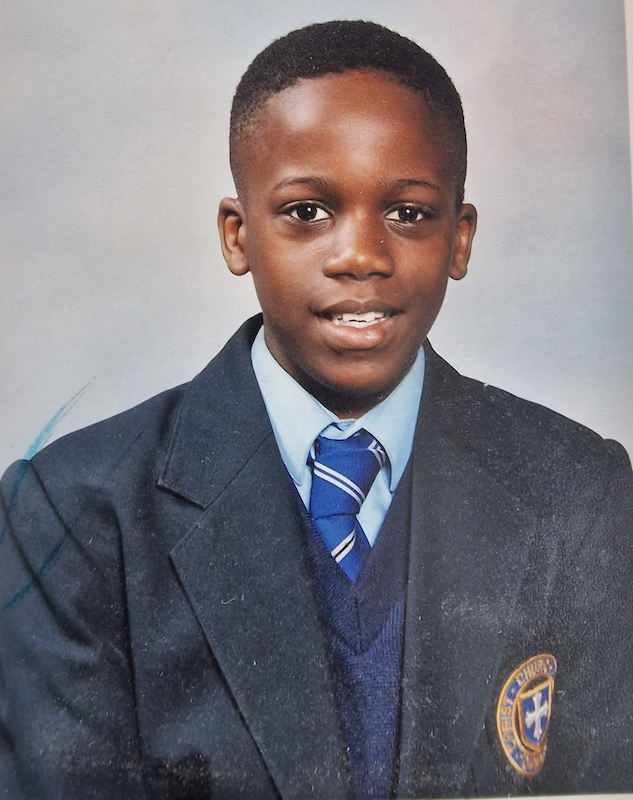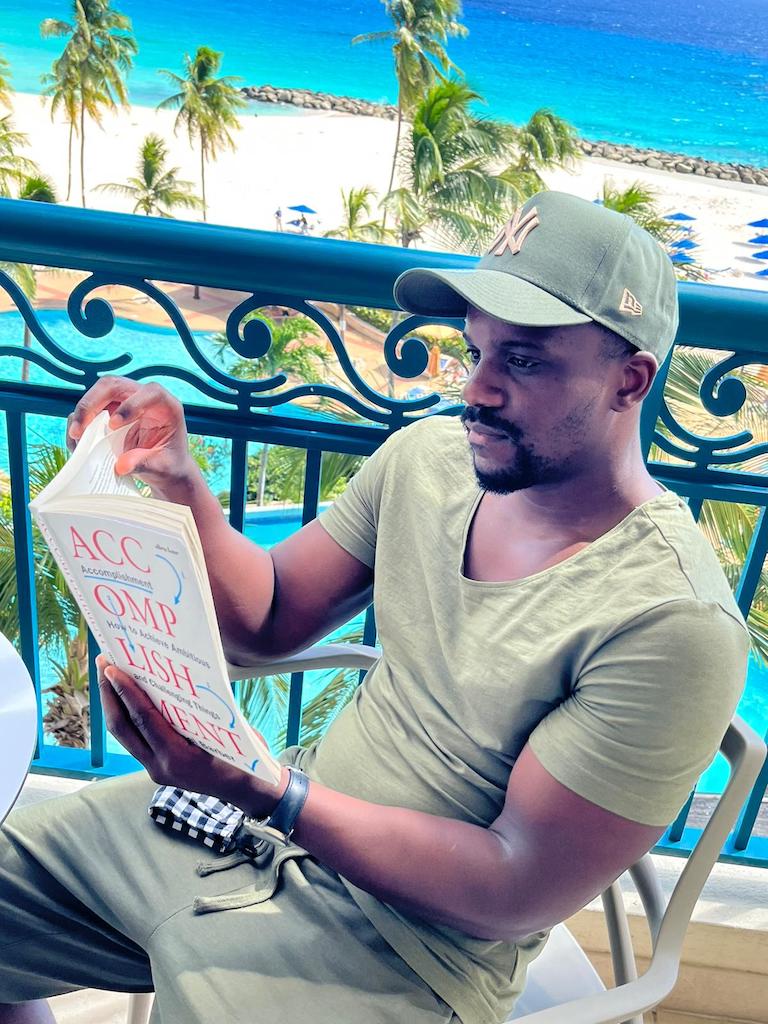Samuel Kasumu interview: the outsider
8 min read
Conservative mayoral candidate hopeful Samuel Kasumu knows many in Westminster think of him as an outsider. But, he tells Seun Matiluko and Tali Fraser, that won’t stop him fighting to be in the room where it happens.
Surrounded by portraits of white men, many dressed in the elaborate military regalia of a bygone colonial era, Samuel Kasumu is relaxing at the Institute of Directors on the capital’s Pall Mall.
The setting could be considered uncomfortable for a Black man who grew up in multicultural Barnet, north London – “the best place in the world” – but the meeting place was his choice. Having been a member of the Institute for a decade, he is not afraid to “walk through doors, where I am the only or the first”.
Kasumu announced his campaign to run for mayor of London in early September, arguing he has what it takes to regain a Conservative foothold in the capital.
Having previously served as a special adviser to then-prime minister Boris Johnson, Kasumu is keen to be in “the room where it happens” – a phrase made popular by the Broadway play Hamilton that refers to a desire to become part of the political establishment.
Elaborating, Kasumu describes a section of his upcoming book, provisionally titled The Power of Outsiders, in which he writes about the 2020 film One Night in Miami… that provides a fictionalised account of a 1964 meeting between African-American icons Muhammad Ali, Malcolm X, Sam Cooke and Jim Brown. “What you have is four different outsiders and distinct views about how outsiders should engage with the fact that they’re outside. Sam Cooke wants to be in the room. Muhammad Ali wants to challenge the establishment. Malcolm X’s view is very clear: you need to be outside creating your own space. Which one of those views is valid? I’m more comfortable in the room where it happens.”

Samuel Fisayo Kasumu was born in 1987 to a British-Nigerian mother and a Nigerian father. The fourth of five children – and the first of two sons – Samuel’s middle name, Fisayo, means “God added to my joy” in Yoruba. (All his siblings are named after members of the British Royal Family – Elizabeth, Victoria, Mary and Phillip). His childhood “wasn’t easy”; his father was absent for most of his childhood and his mother would often go on extended trips to Nigeria, meaning that “for a long time, it was just me and my siblings, trying to figure out how to survive.” In his parents’ absence, he found a family in the church. “The church was like a surrogate parent – that’s where I saw the value of family structures and had access to role models.”
He had initially attempted to quit earlier that year, writing in a resignation letter which was leaked that he was concerned about the party “choosing to pursue a politics steeped in division.” Nadhim Zahawi, who Kasumu had worked with on increasing vaccine uptake among ethnic minority communities, is said to have convinced him to stay.

When Kasumu resigned for good in May, much was made of the fact that his departure came hard on the heels of publication of the controversial Commission on Race and Ethnic Disparities report. Asked now whether he resigned because of the report, he first says “it’s complicated,” then goes on: “I don’t know, you’ll have to read it in my book,” before suddenly announcing, “I can’t say too much because of the Official Secrets Act.”
Despite the instillation of what he describes as “church values,” having Christian morals did not stop Kasumu being excluded from three different schools. On his fourth time around, he found himself in a better school where he earned top grades and won a place at Imperial College, London. However, he decided to turn the offer down, fearing what he perceived as a lack of students from working-class backgrounds would mean he “wouldn’t fit in.” Instead, he accepted a place at Brunel, a university he saw as “a lot more diverse.” It was at Brunel, at the age of 19, that he became a member of the Conservative Party. He had started getting involved in student politics and found himself surrounded by socialists. While most of his friends were ideologically opposed to him – some are now Labour MPs who he’s “not supposed to say” he’s friends with – he felt there were other ways of thinking about social justice.

It was at Brunel that Kasumu and his now wife, Barbara, co-founded Elevation Networks, a social enterprise that tackled youth and graduate unemployment. After Elevation Networks, his next big project was Inclusive Boards, an agency that supports organisations in developing board diversity. Soon after setting up Inclusive Boards, Kasumu was selected to join then-prime minister Theresa May’s 2017 Race Disparity Audit Advisory Board. Although he says he’s “probably far too rebellious” to become an MP, he also spent 2017 running as the Conservative parliamentary candidate for Croydon North – unsuccessfully.
In 2019, having solidified his presence on the Tory radar, he was tapped to become special adviser to then-prime minister Boris Johnson for civil society and communities. For the most part, Kasumu, enjoyed his time with Johnson, suggesting the former PM was “always very supportive of all of my work. It is probably a lot more convenient for me to say he wasn’t. But he was.” Yet, in May 2021, Kasumu resigned.
He is also reluctant to divulge much about the future of The 2022 Group, a newly launched organisation of which he is a founding member, alongside Wilfred Emmanuel-Jones and Festus Akinbusoye, that aims to broaden the appeal of the Conservative Party to Black voters. The founders meet for quarterly dinners at the Royal Automobile Club.
However, Kasumu is more forthcoming when asked about new Prime Minister Liz Truss – “it sounds like Liz has clarity of vision” – and is excited about the appointments of Zahawi as Equalities Minister and Kit Malthouse as Education Secretary, top Cabinet positions that he takes to be indicators she will ditch the culture war politics that plagued the Johnson years.
“One thing that you try to do during an election is avoid pissing people off. I cannot see an election coming and [the Truss Cabinet] choosing positions on subjects that have no consequences to the realities” of the electorate.
Kasumu wants his mayoral campaign to focus on what he describes as the real concerns of the electorate too, explaining that he has “tunnel vision.”
However, he also admits to having a “short attention span”. His life thus far has involved a series of pivots – Imperial to Brunel; running as an MP to becoming a special adviser; resigning as a special adviser to launching a mayoral bid. How can he have a short attention span and tunnel vision? He hits back: “Have you never met an entrepreneur?”
When Kasumu first announced his mayoral campaign with an article for ConservativeHome, he spent considerable time talking about the importance of pausing the Ultra Low Emission Zone expansion in London.
What of his other policies? He won’t say too much because he wants to be strategic about his campaign – “there will be a big splash at the end of October, don’t worry” – but does disclose that housing is at the top of his agenda. If elected mayor, he would leverage private capital to build more housing on land owned by the mayor and Transport for London.
He would also take out compulsory purchase orders on land owned by foreign nationals that are not progressing with house builds.
He says all his actions as mayor would inspire “hope in London.”
Asked about Conservative figures who inspire him, Kasumu pauses. “In terms of British politics, Margaret Thatcher and [former Labour prime minister] Clement Attlee. Although I’m a Conservative, I don’t think it’s a religion, so I would probably take a bit from both.”
Since the departure of Johnson from City Hall, the Conservatives have struggled to find a mayoral candidate that can connect to Londoners, in a city often considered a Labour heartland.
His friend Shaun Bailey secured 44.8 per cent of the vote in the 2021 mayoral elections, a respectable but losing figure figure Kasumu feels reflects that “for a long time, people [in the party] didn’t give him the support that he needed to be able to really make a good go of it.”
Kasumu, who is so far the only declared Conservative candidate for the May 2024 elections, is confident he has what it takes, however: “I don’t think you can find another candidate that has a strong understanding of outer London – because that’s where I grew up and served locally. But [I also have] a distinct response to the challenges you face in inner-city London and a track record on delivering in those spaces. In the Tory Party, no offence to anybody else, you’re just not going to find somebody else like that.”
Whatever happens in 2024, Kasumu will keep fighting to be in the room where it happens.
